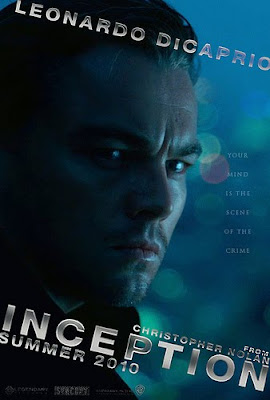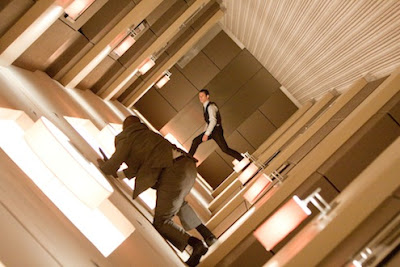SPOILERS and NO SCRIPT LINKS below.
Genre: Sci-Fi
Premise: (from IMDB) In a world where technology exists to enter the human mind through dream invasion, a single idea within one’s mind can be the most dangerous weapon or the most valuable asset.
About: Risking what might be the biggest payout for a director behind Cameron, Lucas, and Jackson, by passing up a direct-into-production follow-up to The Dark Knight, Nolan took advantage of maybe the only opportunity he’ll ever have to make a no-expenses-spared version of this script.
Writer: Christopher Nolan

Okay, this is going to be a blog entry in the truest sense because I’m writing it stream-of-conscious. This will result in a disjointed and herky-jerky review but if there’s any movie review that benefits from such a style, it’s this one.
I didn’t know anything about Inception going in except for a glimpse of the city folding up on itself and that it was something about dreams. So I really had no idea what to expect.
It wouldn’t have mattered anyway. Inception cannot be summarized by a line, paragraph, or even a review. It’s a weird multi-layered journey into a constantly-changing dreamland. To be honest, I’m not even sure if it works. It’s so bizarre, it’s so ambitious, that the film requires multiple-viewings to sort it all out. But as far as what I experienced in this single viewing, these are my thoughts.
A quick breakdown of the plot: Cobb and his team are guns for hire that break into people’s dreams and steal information from them (secret documents, money, whatever the client needs) that these people otherwise wouldn’t reveal in real life. Cobb is recruited by a man named Saito, who owns the second biggest energy company in the world. Saito is worried that his biggest competitor is about to squeeze him out of business. It just so happens that the owner of this competitor is dying, and that his son, Robert Fischer Jr., will be taking over. Saito wants to implant information into Fischer to prevent him from continuing his father’s plans. This is known as an “inception,” — the hardest kind of dream altering there is.

That’s really barebones but my head will explode if I try and explain more. First let’s get to the bad. And I’m just going to come out and say it. The wife storyline was fucking stupid. Every time we went back to Marian Coutillard, the movie grinded to a screeching halt. I appreciate what Nolan was trying to do. I understand how much deeper it made DiCaprio’s character. I understand how it complicated the plot and kept the dreamworld uncertain. But it was a colossal failure. We just kept repeating the saaaaame things over and over again. She wants him to come with her into the dreamworld. WE GET IT! Ironically, the more they repeat this, the more confusing it gets, and by the end I didn’t know if he had a wife, had children, if he was in a dream or not or what the hell she had to do with the story in any capacity.
The funny thing is that the core of this idea is cool and could’ve worked. She’s almost like the bad guy in the beginning, jumping into his dreams and fucking everything up for him. A character like that with dream-like powers/abilities…I mean the possibilities are endless. Yet she’s relegated to whining her ass off the whole second half of the film, asking DiCaprio for the 800th time if he’ll stay with her. Ugh.
Second problem, the exposition. This film IS exposition. Every scene has it. A dozen scenes are practically dedicated to it. And there’s so much to remember that we should’ve been given notepads on our way into the theater. Now a lot of the exposition is fun, because it’s telling us about how the dreamworld and the extraction process works, but Nolan’s so smart and so careful, that he wants to make sure you don’t say, “Yeah but, what if this happens?” So he makes sure to answer every single question the audience might have about the process so as to plug up every single hole. So yes, it makes sense in the end, but at what cost? Characters doling out 3 to 4 page monologues? Is that worth it?

But outside of those two things, I thought the rest was pretty much awesome. There were times when I had trouble keeping up, but once I understood the world and understood what they were trying to do, I really dug it.
I loved the dream within a dream within a dream within a dream (yes, four of them!) plan. I loved how each individual dream had its own point, its own goal (Indian guy had to avoid the bad guys in van dream, Gordon-Levitt had to protect them in the hotel dream, and then all hell broke loose and multiple people needed to be protected/extracted in the third dream). I loved all the Gordon-Levitt stuff in the hotel when he was bouncing around walls and wrapping people up to prepare for the “kick.” I didn’t like Gordon-Levitt before this. Dude just made me the president of his fan club.
I loved the coordinated triple kick where they had to be falling in each successive dream at the perfect time. I loved how the deeper you go into the dream tree, the more time you have, and how Nolan showed that with the slow-motion van falling (for those who haven’t seen it – the van falls for 10 seconds, but in a dream within a dream within a dream reality, that’s like a week). We have some fun with ticking time bombs on this site. This is a ticking time bomb fucking frenzy! There’s ticking time bombs on four different levels. It’s totally wild.
The only dream scenario I didn’t dig was the whole Russian ski-patrol blizzard base. Did Cillian Murphy’s character watch a lot of Roger Moore James Bond films as a child? This was the only part that felt out of place.
From a structural standpoint, the basics are all taken care of. We have a solid ultimate goal: implant the inception into Cillian’s character’s mind so that Saito retains control over the energy business. We have a great motivation for the main character. If he succeeds, he gets to go back to America to be with his children. And even though it takes us awhile to get to that story, Nolan uses a series of sequences to keep the audience focused in the meantime: Find an architect, get the architect back after she refuses, train the architect, find a chemist, find the mind expert (Eames), train and prepare the team for the inception. Late-starting stories are always a gamble, especially on the page, but if you have goal-oriented sequences to keep us focused til we get there, it can work.
There were some minor quibbles. Ken Wantanabe is the man with the power to get Dicaprio back to his children. So when he goes down in the dream world and is dying, why is everyone so casual about it? This guy is THE MOST IMPORTANT MAN THERE.
I’m still not sure why DiCaprio had to go into the fourth-level down dream. To get his wife? What did his wife have to do with this mission? That part felt so forced.
And also, when you have the ability to literally do anything and show anything because of the warped physics and personality of the dreamworld, shouldn’t you show us more than a weird decaying city in the background for the finale? The big money special effects shots were wasted on bullshit exposition scenes like when he tricks Ellen Paige at the cafe and has everything blow up. Why aren’t we saving those effects and doing ten times crazier things in the ending?
Overall, this is really complicated film and one I’ll be wrapping my head around for awhile. I might see it again in the theater (which is rare for me) so that says something. It does leave you with a *feeling*. It’s hard to describe but it definitely affects you in ways normal movies do not. I’d put this as my second favorite film of the year behind Toy Story 3. It’s weird and different and worth the ride if you’re even the slightest bit interested.
[ ] What the hell did I just watch?
[ ] Wasn’t for me.
[ ] Worth the matinee.
[x] Worth a regular-priced ticket.
[ ] Impressive
[ ] Genius
What I learned: If your main story goal starts late, make sure you’ve lined up a series of compelling “mini-stories” to keep us interested in the meantime. The goal here is the inception of Cillian Murphy’ character. But that doesn’t start until 50-60 pages into the script. So essentially, the first half (or third) of the script is dedicated to putting a team together so they can perform this task. That portion is broken down into smaller mini-stories, like I listed above, that have simple goals for the protagonist to perform (find this person, build the dream world, set up the kidnapping). As long as your characters are going after a strong and immediate goal, your audience won’t notice that the central plot hasn’t started yet.

